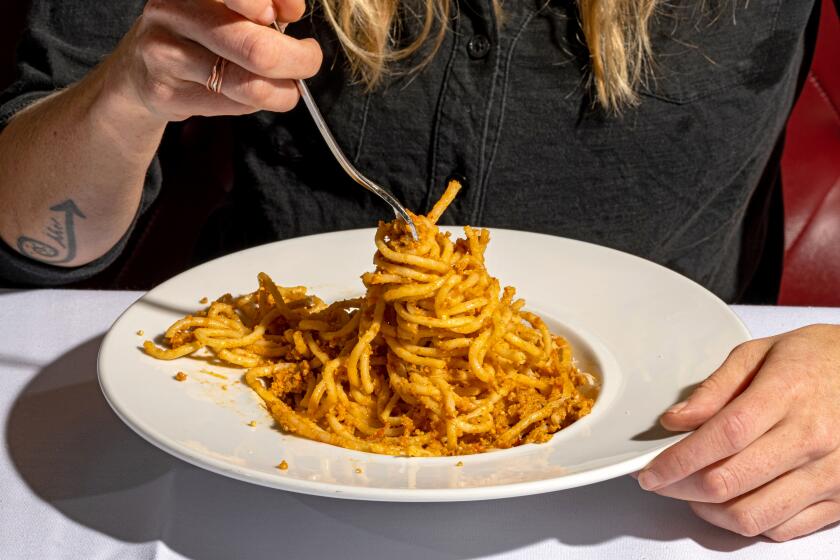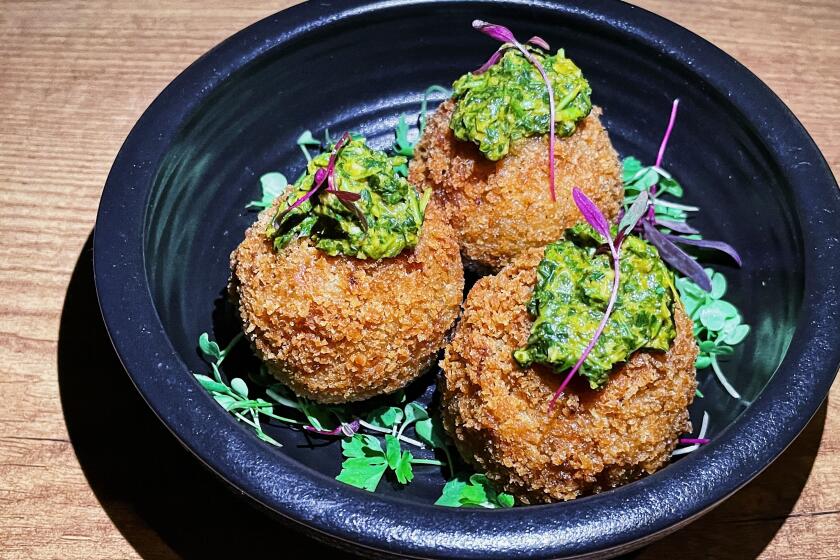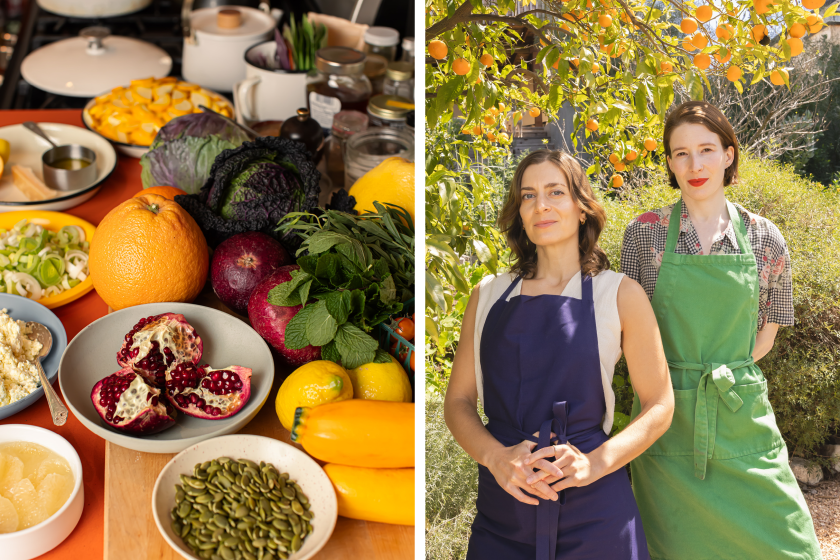Leading L.A. vegan restaurant goes un-vegan. ‘I knew the vitriol that would come my way’

- Share via
On Earth Day chef Mollie Engelhart took to social media with an announcement that rocked L.A.’s vegan community: Her pillar of plant-based dining, Sage Vegan Bistro, would become Sage Regenerative Kitchen & Brewery and begin serving meat and dairy.
Following a vegan diet, the chef-owner said, is no longer enough to combat climate change, so the new iteration of Sage will focus on sourcing and proselytizing regenerative farming practices. That, along with years of post-pandemic financial losses, moved Engelhart to introduce beef, bison, cheese and eggs from regenerative farms into her Echo Park, Culver City and Pasadena restaurants.
The backlash on social media was swift. More than 3,000 comments have poured in, some calling it “a sham,” “deeply disturbing,” “a bummer announcement,” “a huge betrayal to animals,” “devastating,” a “horrific transition” and “profit disguised as environmental progress.” Dozens of vegan and animal-wellness organizations and influencers have shared the news, some calling for a boycott.
Whether you’re already a plant-forward person or contemplating a change in diet, here are 30 restaurants to check out.
“I understand their passion and I understand their sadness and I understand their anger,” Engelhart told The Times. “I had the same views of the world that they did before I shifted my ideas based on my experience in farming, and I have compassion for what they’re feeling. I hope that the vegan community and the regenerative community can really come together because I think they’re both powerful, powerful pathways for change.
“It’s vulnerable to publicly say, ‘I believed one thing, and maybe I was wrong and now I believe something else,’” she continued, “but I hope that it inspires people in their own lives to be willing to be open-minded when something else makes more sense to you.”
Engelhart opened Sage in Echo Park in 2011. Starting May 29, the changes will roll out at that restaurant as well as in Culver City and her Pasadena brewpub.
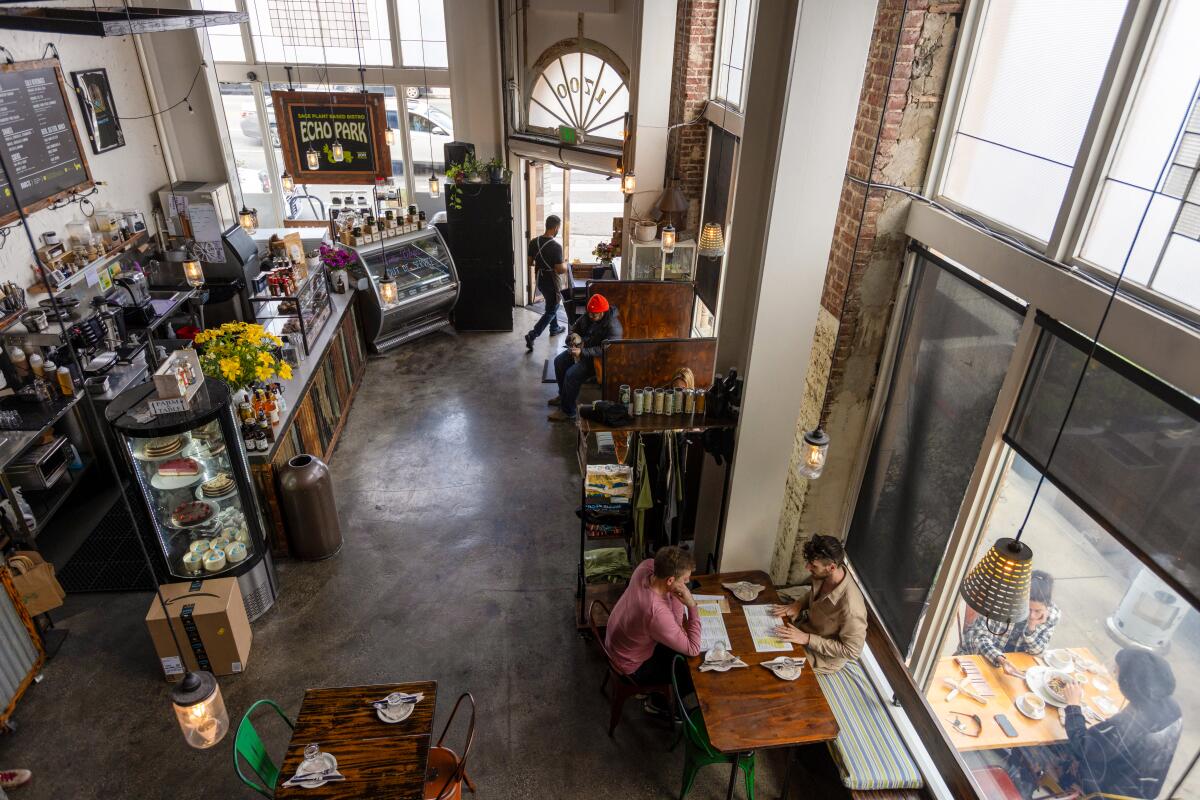
Vegan items will remain, such as buffalo cauliflower, tempeh burgers and the Brazilian-inspired bowl featuring kale, black beans and plantains, but new items including folded “pizza sandwiches” will be available — plant-based and not. Beef and bison will hit the menus. Ramen will be added with options for vegan or chicken broth. Fried eggs and carne asada can be added to existing menu items. Additionally, a new initiative to remove seed oils from the restaurants will mean a switch to nut-based vegan cheeses.
Engelhart contemplated the decision for 18 months before pulling the trigger. “I guess that my back had to be really against the wall to be brave enough to do it because I knew the vitriol that would come my way,” she said. “My restaurants have been really struggling, like so many restaurants post-pandemic.”
According to Engelhart — who operates Sage with her husband, chef-owner Elias Sosa — in years past the restaurants would do $7 million in annual business. But they haven’t been profitable since 2020. To offset the financial losses they closed the Agoura Hills location, flipped the Culver City restaurant into a to-go outpost, and sold their RV, home and Fillmore farm, called Sow a Heart, which previously provided Sage with roughly 20% to 25% of its produce.
Vegetables and grains, not imitation meat, are the draw at these two new plant-based restaurants.
Multiple formerly all-vegan L.A. restaurants have opted to include meat and dairy on menus in recent years, including Hot Tongue and Burgerlords, citing financial viability. By not offering items that appeal to omnivores, restaurants in theory lose out on business; an increase in restaurants offering vegan options, in addition to all-vegan restaurants opening each year, also can make success as an all-vegan restaurant more challenging.
While Engelhart said the decision is partially a financial one, the larger factor is promoting regenerative farming and more ecologically sustainable practices. That topic first caught her attention more than a decade ago via a TED Talk by author and agricultural consultant Graeme Sait, which touched on soil degradation and studies linking it to climate change. It sent her on a years-long mission to dive into regenerative agriculture, a term with no one-size-fits-all definition that could apply to a number of farming practices. It often encapsulates closed-loop soil and feeding systems that offset and capture carbon, usually relying on a number of animals, natural fertilization and other factors to improve the land.
Her brother, Ryland Engelhart, co-founded regenerative-farming nonprofit Kiss the Ground; Mollie Engelhart serves as director of its board. In 2018 she and her husband bought a family farm and started fighting food waste, transporting the compostable byproduct from her restaurants to their farm and placing it back into the soil. After selling their family farm in California, they moved to Texas and built Sovereignty Ranch, which also hosts workshops for practices such as homesteading and dome building.
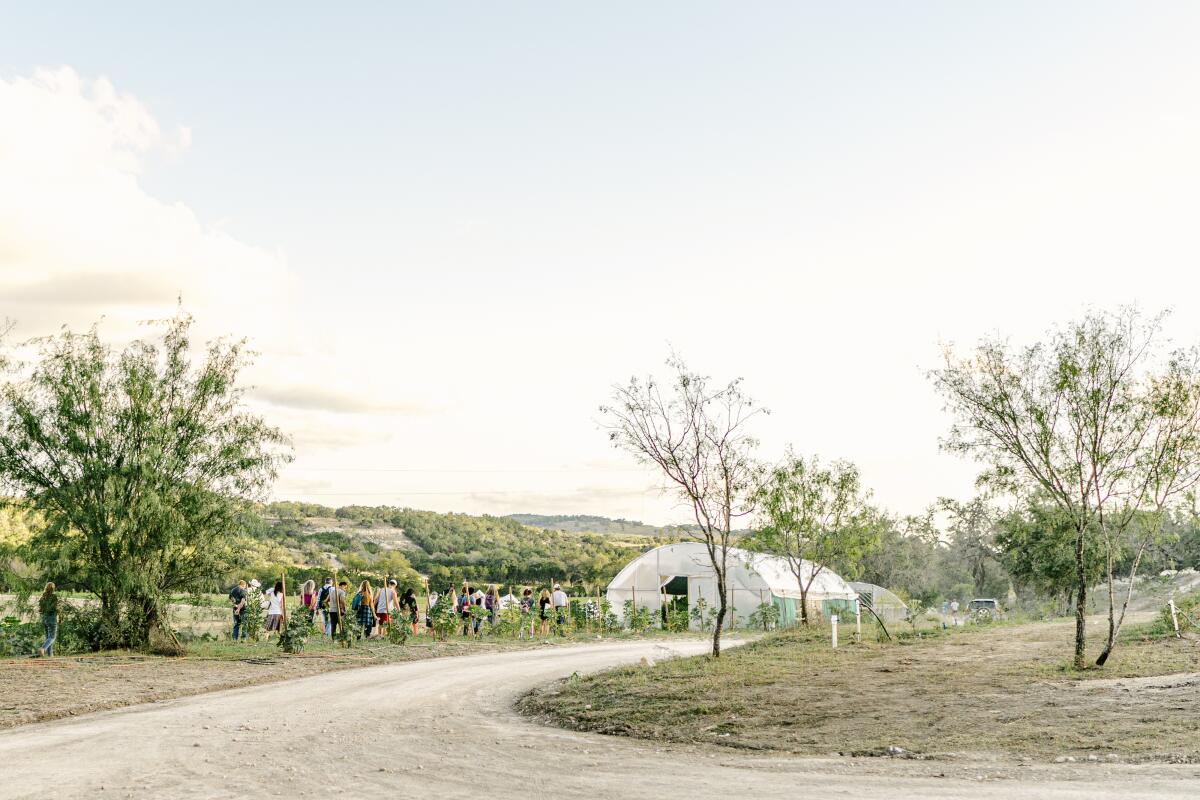
The ranch’s supply chain is still in planning phases with the exception of its corn, used for masa, which will make its way into Sage’s tortillas. When Sage flips to its new menu next month, Engelhart and Sosa plan to serve beef and bison that are all grass-fed and -finished on partner farms via mob grazing, or the practice of moving the animals daily to allow grass and soil to regrow and regenerate nutrients in between grazing. Chickens at Sage will be pasture-raised and also moved daily. Origin Milk, based in Ohio, will produce some of Sage’s dairy products, including cheese.
“I’m not just saying I’m adding meat to the menu to try to get more customers,” Engelhart said. “I’m saying that I think the most important pathway forward for sequestering carbon is bovine on grass, and in order for us to have that at scale, we need people to support it.”
Engelhart garnered the attention of animal rights nonprofit PETA, which took to Instagram to lambaste her announcement. A representative for PETA told The Times that Engelhart’s announcement is an example of “greenwashing,” or using sustainability buzzwords to attract or distract customers.
Learn to cook vegetables in all the best possible ways from the new cookbook “Kismet: Bright, Fresh, Vegetable-Loving Recipes” by Sarah Hymanson and Sara Kramer, the chefs of Kismet and Kismet Rotisserie.
“Sage Bistro is trying to rebrand itself as a champion of the environment while serving meat, and it’s like a firefighter spraying fuel on the flames and saying they’re doing something to help,” said Amber Canavan, a vegan-campaigns project manager for PETA. She added that terms such as “humane,” “free range,” “pastured” and “regenerative” are “meaningless labels” that “ultimately still involve the violent death of an individual who did not want to die.”
“I’m profoundly aware of how people use some of these practices for greenwashing,” Engelhart said. “But I’m also profoundly aware of how these practices — when implemented correctly — make a profound difference.”
According to a 2022 study of more than 100 farmers by environmental nonprofit the Natural Resources Defense Council, regenerative farming results in reduced chemicals and healthier soil, which could trap carbon and aid in water retention. The same report stated these practices “fight the climate crisis, grow healthier food, protect the environment, rebuild rural farming communities, and make farming profitable again.”
Not everyone agrees. A 2022 academic review by biochemist William H. Schlesinger, formerly of the Cary Institute of Ecosystem Studies, found that most regenerative-farming practices “are not likely to lead to a large net sequestration of organic carbon in soils,” sometimes due to the requirement of additional practices that create their own carbon dioxide emissions.
This week Sage’s team has been fielding questions about these practices, as well as its thousands of social media comments.

Some have responded positively to the announcement. Instagram follower Jenna Rainey Pezzolo wrote, “I know this decision didn’t come lightly or easily and I respect your ability to pivot and continue to honor our earth.” Others began verbally attacking Engelhart personally.
“I saw them calling me a murderer like my father because my father has a small dairy farm in Idaho,” Engelhart said. Her father, Matthew Engelhart, is a co-owner of vegan restaurants Gracias Madre and Cafe Gratitude.
“My father ate a hamburger for the first time in 40 years in 2015, and it was massively impactful to all of our businesses. It had a huge impact because people were really upset.”
(According to Engelhart, experts had informed her father that one of his farm’s cows was not saveable, and he opted to harvest and eat its meat when it died.)
Mollie Engelhart still does not eat meat. The chef-owner considers herself vegetarian while at home, opting to make her own yogurt, sour cream and kefir from her cows’ milk, but she is vegan when dining out as ingredient provenance and farming practices are less clear.
According to the World Resources Institute, beef requires 20 times more land and emits 20 times more greenhouse gas per gram of edible protein than beans and most other plant-based proteins.
“Here’s the thing: People are still eating meat everywhere I look,” Engelhart said. “If you want to eat meat ... where can you go get high-quality meat that was raised in a way that is reversing climate change rather than causing climate change? It’s a numbers game. … I think that the next step forward is regenerative agriculture, and for that to move forward it needs to be in the zeitgeist, it needs to be in our everyday conversations. And this is my way to contribute to that, to give people options.”
More to Read
Eat your way across L.A.
Get our weekly Tasting Notes newsletter for reviews, news and more.
You may occasionally receive promotional content from the Los Angeles Times.
